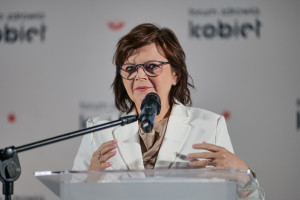A revolution in drug reimbursement. No more waiting months for a life-saving drug

- Patients will no longer have to wait for months to access therapy that is reimbursed on paper
- This concerns medicines within drug programmes that were included in the reimbursement on a specific date, but were physically available to patients only after hospitals had contracted the service.
- This usually takes several months, although there have been cases where patients have waited for medication for 9 months.
- The Ministry of Health has proposed bridging therapy
- The medicine will be available from the 1st day of the reimbursement decision.
- The pharmaceutical company will be obliged to supply the product and finance it for the first three months
- This does not automatically mean that companies will provide the drug for free during this time. The Ministry of Health mentions, among other things, deferred payment
The Ministry of Health has presented a model for access to medicines in drug programmes from the first day of the reimbursement decision being in force.
It happened that theoretically a drug was reimbursed from the day the next announcement came into force, because in practice real availability occurred several months later. The inglorious record holder in this respect was the therapy used in cystic fibrosis - patients waited 9 months to receive the drug . And we are talking about sometimes breakthrough therapies that patients need.
The extended waiting period for patients for therapies is related to the need for the National Health Fund to contract drug programs with hospitals.
- The Ministry of Health has accelerated the reimbursement processes, but the bodies subordinate to the ministry have caught a breath. This time, the breathlessness concerns the National Health Fund, which cannot keep up with contracting services. We should demand that the National Health Fund completely change the way contracts are concluded. But at the moment, such a revolution is unlikely to succeed. Therefore, bridging therapy will be a kind of prosthesis, an equivalent that will apply to about ten therapies per year, because that is how many new drug programs are launched per year on average - explained Mateusz Oczkowski, deputy director of the Department of Drug Policy and Pharmacy at the Ministry of Health, presenting more information about the new proposal during pre-consultations on the amendment to the Reimbursement Act on June 2.
- We propose a solution consisting in access to the drug from the first day of the decision being in force, which is related to the adjustment of the element of financing the therapy and securing the financing of other benefits - he added.
Therefore, following the decision of the Minister of Health to include the therapy in the reimbursement system and create a new drug programme, the responsible entity must undertake a commitment to supply the product and finance it within a maximum of three months from the first day of the decision becoming effective.
Deferred paymentAs Director Oczkowski emphasized, this does not automatically mean that for three months the companies will provide the drug for free or in the form of a prepaid therapy.
- The solutions for risk-sharing instruments are very different, there may also be a solution for deferred payment. Such solutions already exist and agreements are signed. For some very expensive substances, these are even several-year deferrals. We do not want to impose a solution, there will be freedom in this regard - he explained.
This solution is primarily intended to ensure that the burden of financing the service does not fall on the reference center, which will implement the service and accumulate patients in the first three months. Such a center (maximum two nationwide) will be indicated by the national consultant. In turn, the three-month period is intended to motivate the National Health Fund not to continue contracting indefinitely.
In parallel, the National Health Fund will be contracting the drug program with other facilities. When the drug program is contracted, patients will be sent to their target centers closer to their place of residence. This is also happening now and patients can change centers.
Advantages of the solution? - On the one hand, we have patient protection. The patient will know where to go. On the other hand, we have protection of therapy financing from the pharmaceutical company. We also have the National Health Fund's commitment to a three-month contract for a drug program in this area - enumerated the deputy head of DPLiF.
- There is also an aspect related to benefits, because what is the point of having a drug component if we do not have a benefit component? The patient must have tests performed and be qualified for treatment. Funds must be allocated for these tests. Therefore, the terms of concluding contracts with the National Health Fund for this special mode must also be changed so that the drug component is in harmony with the benefit for the first three months, so that it actually becomes a channel of access - emphasized director Oczkowski.
This is just the beginning of changesDuring the meeting, some doubts arose. First of all, whether all branches of the National Health Fund will honor the settlement of the purchase of a drug before the contract for the service is contracted in a situation where payment is deferred. Because the practice in various cases concerning the settlement of services by the payer shows that individual branches of the National Health Fund have very different approaches to the same issues. In such a situation, does the Ministry of Health plan to issue guidelines for the payer so that its practice is consistent?
- The National Health Fund took part in these consultations and proposed some ideas itself. So it is aware of this. Moreover, if one reference center is selected, it is to implement bridging access in accordance with the new model - replied director Oczkowski.
The second doubt concerned what would happen if the National Health Fund did not manage to contract the service within three months?
- I would not like such situations at all. Generally, I would like every drug program, and annexation and contracting to take place as quickly as possible. I hope that there will finally be space to completely change the system and move away from the model of rigid contracting, which is our dream as the Department of Drug Policy and Pharmacy. Such talks were held with the National Health Fund. Will there still be such a desire among the management? We will see, but generally it is worth moving towards change rather than maintaining what we have today - stated the deputy head of DPLiF.
- For now, this bridging model applies to marginal situations and for them we can present an ad hoc solution with little effort, based on cooperation. We do not have to make a revolution for now, but this revolution is expected - he added.
Copyrighted material - reprint rules are specified in the regulations .
rynekzdrowia













